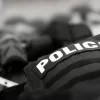|
Getting your Trinity Audio player ready...
|
Why do police routinely make situations worse? Why do we rejoice when foot soldiers of the state discipline a band director for simply finishing a high school band song? Well, to be more exact, tased three times right in front of onlooking students?
Seeing the video of Johnny Mims, a Birmingham band director, being tased and punished by police is infuriating for a number of reasons. Well, to me, at least. For many, primarily whiter colored individuals, they see it as a teaching moment for Mims and the majority of Black onlooking students: Know your place or what happened to Mims, or worse, could happen to you.
Instead of just letting the interaction end, the sergeant ordered the other officers to arrest Mims simply because their pride, or whatever you may call it, was hurt. Making a situation immediately worse. Why do the individuals tasked with discerning and assessing situations to de-escalate routinely do the opposite because they were “disrespected”?
In the video, an officer is heard saying that Mims is going to jail presumably because he did not respect the officer or his command.
“He’s going to jail because I asked Him to respect… that was disrespectful to me,” the officer said. So, that’s all it takes for someone to be confronted by multiple officers and tased three times. And again, he ended the song, just not when the officers told him to, warranting discipline.
Yet, police are notorious for demeaning and demonstrating disdain for the public. Just think about the antagonistic way one police officer asks Mims what he’s going to do after asking them to get out of his face. So even if Mims was “disrespectful,” what did he actually do that constituted a threat?
It’s just interesting, to say the least, how the same individuals who claim to dislike the tyranny of big government are the first ones to applaud the police for disciplining someone, especially a Black person who may be seen as not “obeying” authority. As someone who grew up in a small country town, the primary people I recall saying “f**k 12” in high school were rednecks right before zooming down the road in their lifted trucks with a dip in their mouth and spit bottle rested in the cup holder. But it’s funny how many of those same tunes changed once Black Lives Matter rose to prominence. But I digress.
My central question is: Why do we as citizens pay for police to serve us yet they believe they are superior to us? And what about the harm now rendered not only against Mims but the onlooking children? During a meeting of the Alabama Education Association (AEA), the band president discussed the trauma multiple students were experiencing after seeing Mims tased.
But of course that is the reality for many Black children throughout the country in their encounters with police. And the race of the officers does not matter because at the end of the day, their color is Blue since they’re standing behind that imaginary line defending us from criminal insurrection.
Cops love releasing body cam footage — when it benefits them
It’s always interesting how fast police departments release body camera footage — those tools supposedly implemented to hold police more accountable, which are paid for by the public.
But in actuality, they have become a tool for the police themselves to withhold from the public and release, often edited, when it best suits their whim or public pressure has ostensibly died down. Or not release footage, especially in a state like Alabama, where police departments can stall or ignore public record requests.
I would be remiss not to mention the current farce occurring in Mobile, Alabama, in which a Black man, Jawan Dallas, was killed in July after being tased by police. While the Birmingham Police released footage of the Mims incident in a few days, the city and police department of Mobile continue to prevent the family from seeing footage of the killing. This also demonstrates further why what happened to Mims could have likely resulted in a public execution in front of children for not ending a song because tasers are only “less lethal,” not non-lethal.
Jawan’s family has been showing up to Mobile City Council meetings almost every week since Jawan’s death asking for the body cam or dash cam footage to be released or for the immediate family members to at least be shown the footage. Yet, that can’t happen because an “investigation” is ongoing and now that a grand jury is to be held.
Also, it should be noted that grand juries are veiled in secrecy where attorneys are legally not prevented from lying to the jury.
It’s just so revealing how quickly “protect and serve” somehow turns into slow-walking the family of a deceased individual you were supposed to protect. And on top of it, the identities of the officers involved in Jawan’s death are still not public.
If a cop saves a little kitten tomorrow, their names and faces will be plastered on local or, if lucky, national TV stations as a warm story meant to bring us all together. But let them kill an individual; then their identities must be hidden. Isn’t being an officer a public job, paid for by public taxpayer dollars? Isn’t part of being in a public position dealing with scrutiny?
Should we not all have the right to know the identity, and background of police especially when they kill someone and yet claim to “protect and serve.” But Mobile Police Chief Paul Prine has no issues telling the community during a live conference how Jawan had a criminal record, which definitely has no consequence on affecting the court of public opinion in how they view whether an officer was justified in killing a Black man.
But most importantly, Jawan likely died for something he did not do because police were called to that area for a suspected “burglary.” At least that’s what they claim, but it was likely a trespassing call at best. Just like Mims, police were called and made the situation worse. Only, for Jawan, it resulted in his untimely death.





















































